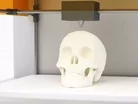How Australia is using 3D printing to improve cranial reconstruction

The human brain is a powerful, yet fragile organ that is completely dependent on a solid skull to keep it protected.
As part of a new procedure using stem cells and advanced 3D printing technology, a team of Australian scientists is developing new ways for patients in need of cranial reconstruction to regrow parts of their skull.
RELATED TOPIC: 3D printing reshaping the Australian medical industry
Most of these patients either had their skull badly damaged in a serious head injury or were born with a skull-related deficiency. As a result, this new procedure would have a piece of bone removed and later reimplanted.
Cranial reconstruction is often a difficult process, in particular for patients with severely-damaged skulls. In addition to the damage that has occurred, some have had pieces of skull removed for surgery or to relieve pressure on swollen brain tissue.
RELATED TOPIC: 3D printing gives new limbs to Sudan's 50,000 amputees
Furthermore, surgeons currently often use titanium plates, plastics or ceramics during this operation, which can lead to infection.
With the help of a A$2 million grant from the Western Australia State Government, the 3D printed cell-based skull replacement may possibly increase the success rate of the procedure, and the quality of life for patients following the intense surgery.
RELATED TOPIC: Woman receives 3D printed jaw in pioneering transplant
As studies on 3D printed stem cell cultures continue, the research team at Western Australia’s Royal Perth Hospital is focused on making strides toward improving the results of these cranial reconstructive operations, all while making it more time friendly and cost effective.
This could potentially become a game-changer in cranial reconstruction.
“This project highlights some of the innovative and groundbreaking research that is under way in Western Australia’s public health system, and the commitment of the Government to supporting this crucial work,” said Australian Health Minister Kim Hames.
Click here to read the latest edition of Healthcare Global magazine!
- Comarch Diagnostic Point Boost for European Health InsuranceHealth Insurance & Finance
- GE Healthcare: Defining the Future of Healthcare TechnologyTechnology & AI
- Kearney Calls for Improved Gender Equity in HealthcareMedical Devices & Pharma
- Top 10: Medical Device AssociationsMedical Devices & Pharma


